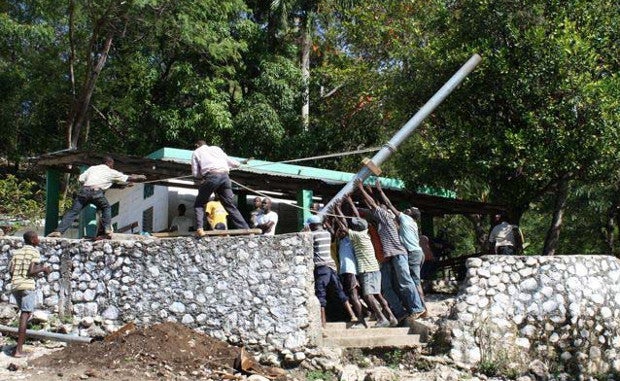by Virginia Snyder and Alice Driver
Latin America and the Caribbean is predicted to be the first region in the world to achieve universal energy access. The region also has the highest use of renewables like solar, hydro, and wind, and it is leading the way in sustainable energy innovation. The IDB is the Latin American and Caribbean Hub of the United Nations Sustainable Energy for All initiative, which aims to provide universal energy access and to double energy efficiency and renewables by the year 2030. The Bank has implemented several successful sustainable energy projects in Haiti that offer important lessons about increasing energy access in areas that have little infrastructure and/or are isolated.
As this IDB video shows, access to electricity in Latin America and the Caribbean has improved significantly over the last two decades and is currently at 95%. However, reaching the last 30 million people will require planning and coordination, especially in Haiti. Internal surveys taken by the Government of Haiti (GOH) estimate electricity access at 28%6 (6% in the rural areas), which leaves about 7 million Haitians without basic energy services and with little access to economic development opportunities. According to the Sustainable Energy for All Tracking Tools report (2013), the percentage of population having access to electricity was 34% in 2010, of which 12% was in rural areas. These numbers still place Haiti far below the other LAC countries.
Although Haiti presents many challenges, several IDB projects in the area highlight the opportunities for providing energy access to improve daily life. In response to the 2010 earthquake, the Bank implemented 12 photo-voltaic systems on health centers in the South Department of Haiti during March and April of 2012 and solar street lights in two refugee camps. This initiative was part of the Emergency Program for Solar Power Generation for Haiti, which was set up to support Haiti in the provision of clean energy through the use of photo-voltaic panels. Specifically, the objective was to support the country’s emergency responses by providing an autonomous energy source (stand‐alone solar energy system) for emergency centers and key establishments.
The following feedback from the health care centers illustrates the value of having a reliable source of electricity:
- Chantal: “Yes, now we have a new service Centre de Depistage volontaire (HIV‐AIDS testing), we use computers for this service and the administration also. We work any time because we have power. The laboratory can do more work per day.”
- Coteaux: “Now we work during the night when we have emergency, before we had the system, the Lab didn’t work anytime. We can deliver baby at night and at any time.”
- Damassin: “Now we can deal with an emergency during the night and we can deliver a baby anytime. It’s easier for us – we don’t use kerosene lamps or candles anymore.”
In a video documenting these projects, IDB Energy Specialist Christiaan Gischler discussed how solar street lights reduce violence in refugee camps and how solar panels make healthcare more accessible and provide better care for patients. The installation of these systems has had a direct impact on the level of care provided at the centers, enabling enhanced laboratory work, emergency services, maternity services, and general patient care after dark without relying on generators or kerosene lanterns. The video shows the human impact of sustainable technology like solar panels and provides evidence of how energy access can change lives. “If there is one thing that we have, that this country has, well it certainly has the sun. So let’s use the sun to bring energy to realize this dream,” explained IDB Energy Specialist Kénol Thys. This project demonstrates both the feasibility and the benefits of powering remote facilities in Haiti with solar electricity.
Please visit us on Facebook for further information.




Leave a Reply